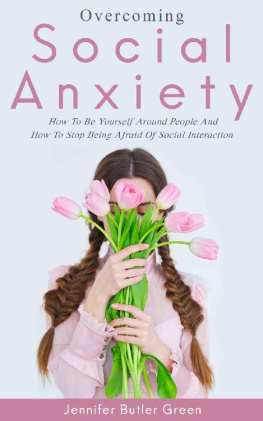Overcoming Social Anxiety
How to Be Yourself and How to Stop Being Afraid of Social Interaction
Jennifer Butler Green
Copyright 2018 - All rights reserved.
The content contained within this book may not be reproduced, duplicated or transmitted without direct written permission from the author or the publisher.
Under no circumstances will any blame or legal responsibility be held against the publisher, or author, for any damages, reparation, or monetary loss due to the information contained within this book. Either directly or indirectly.
Legal Notice:
This book is copyright protected. This book is only for personal use. You cannot amend, distribute, sell, use, quote or paraphrase any part, or the content within this book, without the consent of the author or publisher.
Disclaimer Notice:
Please note the information contained within this document is for educational and entertainment purposes only. All effort has been executed to present accurate, up to date, and reliable, complete information. No warranties of any kind are declared or implied. Readers acknowledge that the author is not engaging in the rendering of legal, financial, medical or professional advice. The content within this book has been derived from various sources. Please consult a licensed professional before attempting any techniques outlined in this book.
By reading this document, the reader agrees that under no circumstances is the author responsible for any losses, direct or indirect, which are incurred as a result of the use of information contained within this document, including, but not limited to, errors, omissions, or inaccuracies.
Table Of Contents
Introduction
Anxiety is a condition where one is in a troubled state of nervousness. It is a state of undesirable feelings of fear or uncertainty over the future similar to the feeling of imminent death. Anxiety is very different from fear. Fear refers to a reaction to something that is real or perceived as an immediate threat, but on the other hand, anxiety is an anticipated future threat that may not necessarily be real. Anxiety is characterized by fear and worries and is mostly termed as an overreaction to a situation that is a subjective menace. Anxiety also comes accompanied by tensions of the muscles, restlessness, and fatigue and concentration problems. Anxiety is healthy, but when it is extreme and goes on for a long period, it may result to an anxiety disorder.
People who suffer from anxiety show withdrawal symptoms from situations that have triggered anxiety in their past. There are several varieties of anxiety when someone experiences angst or nihilistic feelings. Other varieties of anxiety include stranger anxiety as well as social anxiety. This book will concentrate on social anxiety; however, it is good to have a comprehensive understanding of anxiety in general before we delve into social anxiety. Social anxiety happens when someone is fearful and anxious around unfamiliar people or even other people that he or she is used to.
Anxiety can occur for a short period or extend for a lengthy span. Anxiety disorders are among a group of mental disorders defined by feelings of being anxious and fearful, while the trait anxiety is about worrying about future events. Disorders related to anxiety could be genetic but may also arise due to drug use as well as withdrawal from drugs. Anxiety is associated with other mental disorders, such as bipolar condition, personality disorders, and others related to eating. Common choices for treatment include lifestyle changes, visiting a therapist, and medication.
Anxiety occurs in situations that seem unavoidable, but in reality, they are. Signs of anxiety differ in number, strength, and the rate at which they occur depending on the particular person. Almost every person has had an experience with anxiety at a certain point in their lives even though a majority do not develop long-term problems related to anxiety. Anxiety that is caused by the need to select between two options that are the same is a common issue for individuals and organizations. Currently, everyone is faced with greater choices, and competition is also stiff while there is limited time to consider options or seek advice.
When it comes to making up ones mind, not knowing what to expect, the fear of the unknown can spark emotional explosions in anxiety patients and this negatively influences the process of making decisions. This kind of anxiety disorder is divided into two types. The first one is a choice that has multiple probable outcomes with known probabilities, while the second one is the uncertainty as well as ambiguity related to a decision where there are multiple possible outcomes with unknown probabilities.
Let me share with you my own personal story. Maybe some of the thoughts I had are also familiar to you. Some of them were as follows:
- I could not get my thoughts from spinning round and round.
- I used to wake up with a feeling of dread, and I had no idea why.
- I could also not stop worrying about my kids, whether they are doing fine, and asking myself if I was doing enough to assist them.
My worries involved thoughts about negative events that might occur in the future or sometimes about things that I had done or said in the past that I wish I could have tackled differently. Additionally, I also had concerns about what other people thought about my actions. Some of the questions and concerns I raised when I first visited a specialist were as follows:
- What was I to do to feel less stressed, angry, and overwhelmed?
- What was I to do if I felt panicky?
- What was I to do to stop worrying about everything?
Eventually, I got help, and that is why I am writing this book to assist other people that are in the same predicament that I experienced. I hope that this book will be helpful. My purpose is to help people like you overcome social anxiety, and by picking up this book, you have made the first bold step to recovery. This book is a one-stop shop for everything you would want to know about social anxiety.
Chapter One: Understanding Social Anxiety
Social anxiety refers to the great and intense fear of social situations that causes a huge problem in ones life. It is triggered by situations that are defined as social. Social situations include parties, lunches, dates, presentations, speeches, or even exams. Those who suffer from social anxiety tend to feel as if they will be negatively judged by others and that they will suffer from humiliation or extreme embarrassment. At times, a person may feel extreme anxiety up to a point that it escalates into a full-blown panic attack. Individuals who suffer from anxiety know that their fear is irrational, but they cant do anything to stop it.
Now that you know what social anxiety is, let me tell you what its not. Social anxiety is not just a feeling of shyness, nervousness, or the fear of talking to strangers. In the event that most of the times you become unreasonably filled with anxiety during social interactions but you feel a sigh of relief when you are not with others, then chances are that you are suffering from social anxiety. Social anxiety disorder was earlier known as social phobia and is a much greater problem than past estimates projected. A lot of people all over the world suffer from social anxiety.
In America, studies and extensive research have ranked social anxiety disorder as number 3. It follows depression and alcoholism. It is estimated that approximately slightly less than 10 percent of the population in the United States suffers from some form of social anxiety. Additionally, the prevalence rate within ones lifespan for developing social anxiety disorder is at an average of 13.5 percent. A social anxiety disorder that is specific is when a person is afraid of talking specifically in front of a group of people. On the other hand, when a person suffers from generalized social anxiety disorder, he or she is always full of anxiety, nervousness, and uneasiness in almost each and every social interaction.











